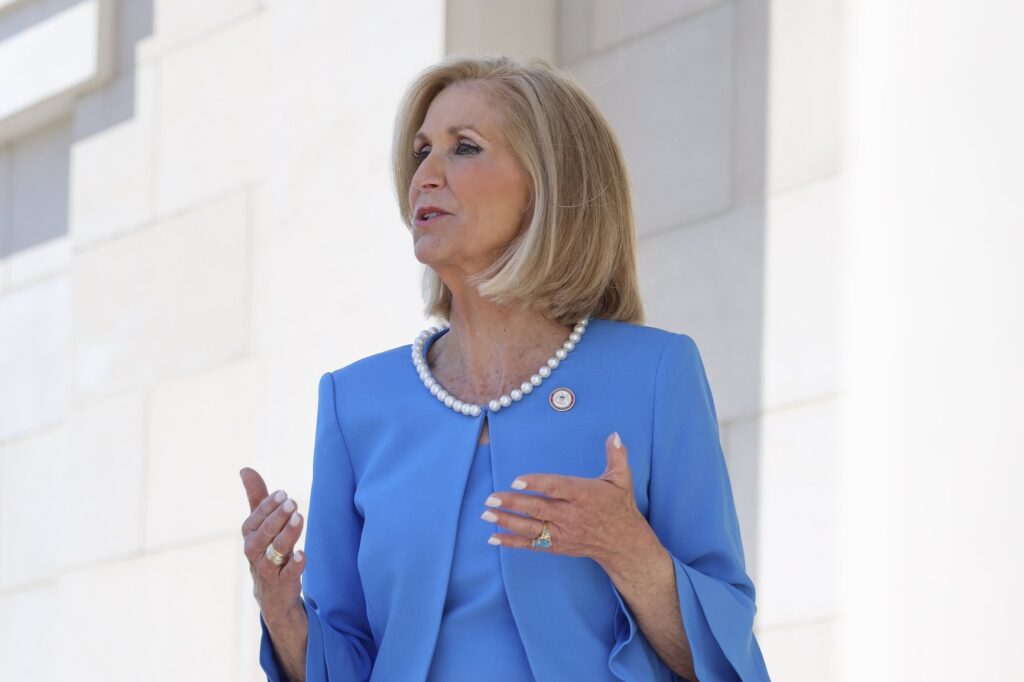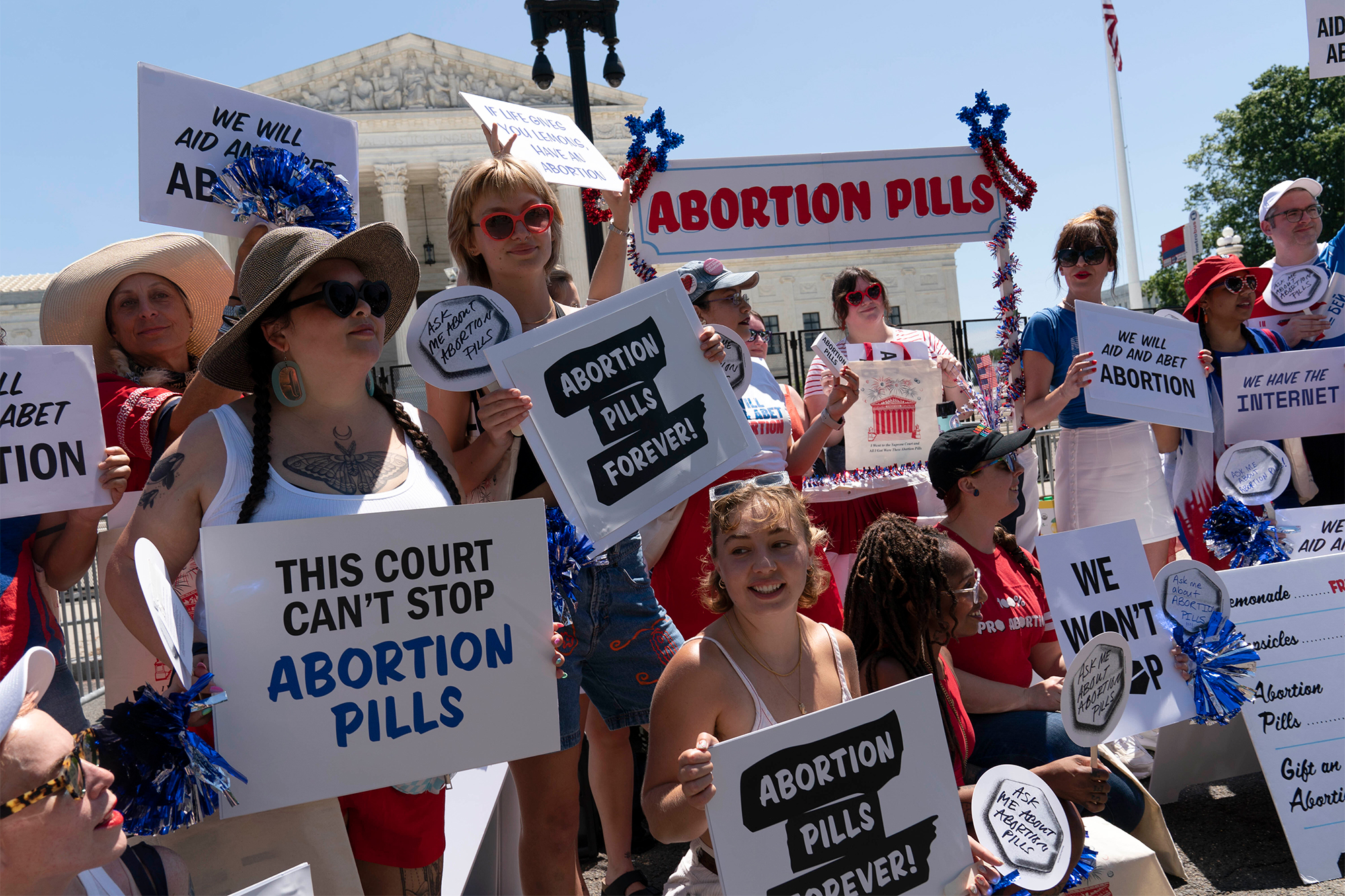Mississippi Attorney General Lynn Fitch told a federal court last week that U.S. law already makes mailing abortion pills a crime punishable by up to five years in prison and even racketeering charges. She made the argument on the behalf of the State of Mississippi as a defendant in a case against GenBioPro Inc., a generic manufacturer of the U.S. Food and Drug Administration-approved abortion pill mifepristone.
In the case, GenBioPro, Inc. v. Edney, the pharmaceutical company is arguing that the State’s trigger law banning almost all abortions at any stage “prevents GBP from selling its product in Mississippi” and that it “prevents access to an FDA-approved medication that has been deemed safe and effective.”
“The trigger law does not conflict with or frustrate any federal law or policy,” Fitch responded in an Aug. 4 filing in the U.S. District Court For The Southern District of Mississippi. “The trigger law does not impermissibly regulate the safety or efficacy of an FDA-approved drug. Rather, the trigger law prohibits primary conduct—performing abortions—that the State is constitutionally entitled to prohibit.”
The U.S. Supreme Court ruled that states can regulate abortion, including by enacting broad prohibitions, when it overturned Roe v. Wade at Fitch’s request on June 24, 2022.
Fitch: Federal RICO Charges, Prison Possible
In the Aug. 4 filing, Mississippi’s Republican attorney general argued that no federal policy “preempts state laws banning medication abortion.”
“If anything, federal law adopts the opposite policy from what GBP claims. Federal law criminalizes the use of the mails to do what GBP demands this Court to allow it to do: distribute abortion-inducing drugs,” Fitch said.

She cited two sections of the U.S. code. The first, 18 U.S.C. § 1461, says that “every article or thing designed, adapted, or intended for producing abortion, or for any indecent or immoral use” is “nonmailable.” The second law, 18 U.S.C. § 1462, prohibits using “any express company or other common carrier or interactive computer service for carriage in interstate or foreign commerce … any drug, medicine, article, or thing designed, adapted, or intended for producing abortion.”
Both laws say that anyone breaking them could face up to five years in prison for a first offense or up to 10 years for subsequent offenses. The federal government has long declined to enforce those parts of the respective laws, however. Fitch argued in her lawsuit that those convicted under 1461 and 1462 could even face racketeering charges under the federal Racketeer Influenced and Corrupt Organization Act, also known as RICO. The earliest of these laws, known as the Comstock Act, dates back to 1873.
Former Democratic President Bill Clinton signed an update to 1462 with the Communications Decency Act, in 1996. Its sponsors’ primary goal was to ban online pornography. Congress passed the law in response to lobbying from Christian-right organizations like the American Family and the Family Research Council who claimed they wanted to protect children from obscenity.
Then-U.S. House Rep. Henry Hyde added a provision in the bill to ban the use of “interactive computer services” for transmitting information on how to “obtain” or “produce” an abortion; it already included a prohibition on transmitting such information with printed materials. (Hyde was an Illinois Republican known for the Hyde Amendment, which banned federal funding for abortions, and he is a distant relative of U.S. Sen. Cindy Hyde-Smith, R-Miss.)
Fitch’s office did not agree to a request for an interview to discuss her filing in the GenBioPro case.
“We do not comment on active litigation,” Chief of Staff Michelle Williams said. “We will let our filings speak for themselves.”
Attorneys for GenBioPro did not respond to a request for comment.
Some legal experts have recently argued that the federal laws Fitch cited banning the use of mail to send abortion pills are null, however. A June 27, 2022, article in Reason cited Professor David S. Cohen, an expert on gender and law at Drexel Kline School of Law, who said “the circuit courts long ago declared they only apply to unlawful items.”
“So, since abortion is (federally) legal and the FDA has approved distribution of mifepristone as safe and effective, including by mail, these are lawful activites and items, thus the law, as interpreted by the courts, doesn’t apply,” Cohen said. “Even now that some states have made abortion illegal, the pills still are legal under federal law. This is why no one in any of the litigation, regulatory comments, or other advocacy around medication abortion for the past decades has raised these laws, even the Trump administration in the litigation about mailing pills that went to the Supreme Court.
“To put a finer point on it, any contrary interpretation than what I explained here would ban abortion everywhere because every device used to perform an abortion in a clinic (forceps, cannulas, etc.) would be banned from being shipped to clinics. These are lawful items for lawful procedures so they can be sent in the mail.”
1996 Law Sparked Lawsuits, Warnings
When he signed the Communications Decency Act into law on Feb. 8, 1996, Clinton said he “object(ed) to the provision in the act concerning the transmittal of abortion-related speech and information,” but that he had assurances it would not be enforced.
“The Justice Department had advised me of its longstanding policy that this and related abortion provisions in current law are unconstitutional and will not be enforced because they violate the First Amendment,” Clinton said.

In a letter to then-Vice President Al Gore the next day, then-U.S. Attorney General Janet Reno confirmed that the Justice Department would not defend the abortion-related content of the update law. She pointed to past decisions about enforcing similar prohibitions, including 18 U.S.C. § 1461, the other law Mississippi Attorney General Lynn Fitch mentioned in her Aug. 4, 2022, court filing. Reno noted that in 1981, U.S. Attorney General Benjamin Civiletti, an appointee of Democrat Jimmy Carter, announced that he would not enforce 1461 because it was “unconstitutional.”
“Section 1462 is subject to the same constitutional defect as 1461 and 3001 with respect to its application of abortion-related speech and information,” Reno said in the Feb. 9, 1996, letter.
The act drew several lawsuits, including one the Center For Reproductive Law and Policy (now known as the Center For Reproductive Rights) filed in New York in 1996. Despite Reno’s assurances, the organization still asked for a judge to rule on the law’s prohibition on abortion-related speech.
“We are extremely pleased that the Clinton administration has recognized the invalidity of this law,” Effector Online reported attorney Simon Heller saying on Feb. 14, 1996. “However, we believe a court ruling against the provision barring receipt or provision of abortion information is still necessary to prevent a future administration or radical right-wing members of Congress from wielding it against women’s health care providers and advocates.”
In March 1997, though, a federal judge threw out the challenge to the law’s abortion-related speech provisions, citing the fact that “the Chief Executive and his principal law enforcement officer have publicly announced their intention not to enforce the law, not once but on several occassions.” If the government changed its mind and decided to enforce the abortion provisions, he said, opponents could challenge it then.
In Reno v. ACLU in July 1997, the U.S. Supreme Court struck down the parts of the Communications Decency Act centered on pornography for being too vague and violating the 1st Amendment’s free speech protections, but the unenforced abortion provisions remained intact—including the prohibition on mailing abortion medications.
FDA Approved Medication Abortions
Starting in April 2021, the FDA under President Joe Biden announced that it would lift requirements for abortion patients to visit a clinic or medical hospital in order to obtain mifepristone during the pandemic, allowing telehealth options with abortion pills sent by mail. The FDA permanently removed that requirement in December 2021, though it could reinstate it during a future administration.
Since the U.S. Supreme Court overturned Roe v. Wade in Dobbs v. Jackson Women’s Health Organization and the State forced Mississippi’s only abortion clinic to close, abortion-rights advocates have openly discussed options for pregnant people to obtain pills by mail—including from overseas vendors. One organization that supports abortion rights has even erected billboards throughout the capital city promoting the option.
The legal risks are hazy, though. Aside from the unenforced federal law Attorney General Lynn Fitch cited in her Aug. 4 court filing, state lawmakers are openly discussing their desire to pass new state laws targeting mail delivery of abortion pills in the 2023 legislative session.
Mississippi’s abortion trigger law makes it illegal for “any person, except the pregnant woman” to “knowingly or recklessly perform or attempt to perform or induce an abortion in the State of Mississippi” except when necessary to preserve the life of a pregnant person or in cases of rape if first reported to law enforcement It defines abortion to mean “the use or prescription of any instrument, medicine, drug or any other substance or device to terminate the pregnancy of a woman known to be pregnant with an intention other than to increase the probability of a live birth, to preserve the life or health of the child after live birth or to remove a dead fetus.”

The Center For Reproductive Rights did not agree to a request for an interview to discuss laws regulating abortion medications like the federal law Fitch cited, saying they were “at capacity and (could not) accommodate an interview.” The organization instead sent a statement from Elisabeth Smith, its director of state policy and advocacy.
“Medication abortion has been scientifically proven to be a safe and effective method to terminate a pregnancy,” Smith said. “The FDA has said medication abortion can be provided via telemedicine and the mail and President Biden has directed the Health and Human Services Department to do everything in its power to expand access to medication abortion.
“Restrictions against mifepristone and misoprostol are medically unnecessary and are based on misinformation. This just shows that restrictions on abortion have nothing to do with people’s health but instead threaten the wellbeing of communities across the country.”
See the MFP’s full coverage and archive on abortion rights in Mississippi here and the Jackson Free Press archive here.






